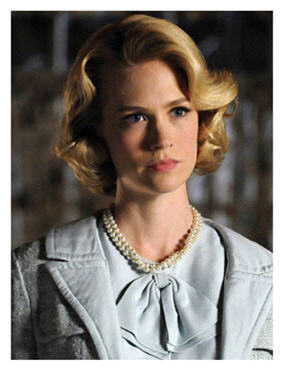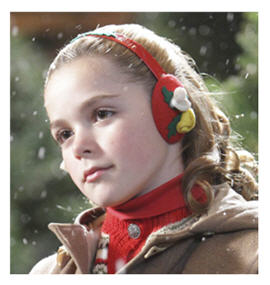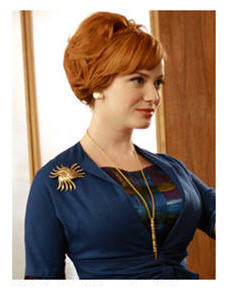Who doesn’t love to fantasize about days gone by, romanticizing a period in history that seems more glamorous, more exciting, or simpler?
 As an avid fan of AMC TV’s Mad Men, I’m as susceptible to the appeal of this award-winning drama as anyone. The portrayal of life in the 1960s is seductive, surprising, and accurate in so many respects.
As an avid fan of AMC TV’s Mad Men, I’m as susceptible to the appeal of this award-winning drama as anyone. The portrayal of life in the 1960s is seductive, surprising, and accurate in so many respects.
To me, this isn’t history – it’s my childhood – right down to the knotty pine paneling in Betty Draper’s kitchen, the turquoise-toned blues that were favored for walls, the step stool by the phone, and the frequently unsettling ways that women behaved toward each other, and toward their children.
Why we love Mad Men
We know why we love Mad Men. The actors are scrumptious to look at, and their roles, inscrutable enough to hold our interest. In fact, they accomplish much more than that; this series has captivated the country with its mix of compelling narrative, complex characters, and cultural commentary.
As for the women, they’re delicious.
Sure, I’m appreciative of the Jon Hamm’s considerable charms as Don Draper. I love his story, and watch his inability to keep it zipped with mixed emotions. He redeems himself with what we perceive as a good heart, and in the warmth and attentiveness he consistently offers his children. Especially because their mother seems incapable of doing so.
Maternal instincts? On this show, we barely see a trace.
Were you a child in the 60s?
 I look at Sally Draper, at this sometimes bewildered and generally lonely child, and I empathize. I was about her age in the mid sixties. Though my mother bore no resemblance to Betty Draper in most ways, she was an educated woman who was unhappy inhabiting the role of homemaker and mother. She didn’t drink or smoke, but she popped assorted diet pills for at least a decade, and I wonder to what extent that influenced her erratic behavior.
I look at Sally Draper, at this sometimes bewildered and generally lonely child, and I empathize. I was about her age in the mid sixties. Though my mother bore no resemblance to Betty Draper in most ways, she was an educated woman who was unhappy inhabiting the role of homemaker and mother. She didn’t drink or smoke, but she popped assorted diet pills for at least a decade, and I wonder to what extent that influenced her erratic behavior.
She was also alone a great deal, and must have harbored tremendous resentments in finding the reality of marriage to be anything but what she anticipated. Like so many mid-century women.
As for children, they were expected to be seen and not heard, to entertain themselves, and to do as they were told. Divorce? It was exceptional, regardless of the state of the marriage.
Peggy and Joan
It’s not only Betty Draper who startles us with her seemingly unfeeling approach to mothering. Peggy, the young copywriter who bears a child out of wedlock, gives away her infant. We never see regret, or even wistfulness, when it comes to her actions.
- What sort of single mother might she have been?
- Did she make the right decision – not only for herself, but for the baby?
 Then there’s Joan. She’s strong, smart, sexy, and sexual. She thinks fast on her feet. She gets things done. She also puts up with plenty – in the workplace, and at home, married to a man who doesn’t have an inkling of her depth or capacity. We only recently learn that she’s had two abortions, but she still wants to be a mother, when the time is right.
Then there’s Joan. She’s strong, smart, sexy, and sexual. She thinks fast on her feet. She gets things done. She also puts up with plenty – in the workplace, and at home, married to a man who doesn’t have an inkling of her depth or capacity. We only recently learn that she’s had two abortions, but she still wants to be a mother, when the time is right.
Her physician husband is sure to be sent to Vietnam. And were she to get pregnant, bear a child, and ultimately raise it alone, would she be up to the task of single motherhood? Certainly, as a widow, her social status would remain intact.
A widow is one thing, and a divorcee, quite another. In that regard, how much has really changed?
Betty Draper as a single mother?
Betty, divorced after a decade of marriage, is remarried. She has three young children by her ex, and while her Grace Kelly cool may be elegant to look at, her chilly mothering is appalling by today’s standards. Yet her detachment is not unfamiliar for children of the sixties.
What I also believe – this fictitious character was only willing to jump ship because she would spend no time as a divorcee. She had a second husband all lined up, one who had the pedigree she was seeking, and was willing to provide for her and the children.
Recently I had an online conversation with Dr. Leah Klungness, who writes on single motherhood. She’s also a fan of Mad Men, and we wondered how Betty in particular would handle the challenges of single parenting.
And for those who follow the show, is that really a stretch? She may be in for a rude awakening. Isn’t her new husband, Henry Francis, already less blinded by her beauty, and witnessing her active anger toward her ex, not to mention her coldness toward her children? Might she find herself a single mother after all at some point? Yes, there’s money to pay for domestic help. And if there were not?
How would she fare as a single parent? And what about Joan or Peggy?
For more discussion on single parenting:
- Single Parenthood: How do you really feel?
- Single Parent Guilt, Seth Godin’s Egg
- Parenting Without a Safety Net
- Parenting is a Profession. Where’s my Paycheck?
Images courtesy AMCTV.com.
© D A Wolf
Betty will be fine as a single mother; Don wasn’t ever home anyways, so she’d pretty much been doing it alone the whole time. She’ll still be incredibly cold and uninvolved, though. At least she expects her kids to have manners, which I can’t say for a lot of children today.
Peggy would be…efficient? The kids would have their basic needs met, but I don’t know about cuddles…
I see Joan as the warmest of the bunch, but still, I don’t know. Maybe it’s because I cannot picture sexy Joan EVER being without a man. 🙂
Interesting food for thought, BLW.
Isn’t it interesting that they make the coldest of the bunch (Betty) the most fertile? And Trudi, Pete’s wife, who seems (overly?) nurturing and wants desperately to be a mother can’t get pregnant, and her husband refuses to adopt. Such a beautifully flawed set of characters they’ve given us, don’t you think, Kitch?
Great impressions, TKW. Peggy is a tough cookie in her own way, isn’t she. But then, she’s so young still. Wonder what she would be like 10 years out, hardened by making her way in a 1960s-1970s corporate world – still very much a man’s world. (Believe me. I was there.) Might that make her soften if it came to raising a child? Or the opposite?
This show sounds interesting. I might have to check it out.
I was not a child of the 60s, but from what you describe above, I can understand why there is a gap between the way I am raising my daughter and the way my parents raised me and their thoughts about my parenting…
But I am not sure that things have changed much in some families. There is often a show of being involved with the kids, yet it is just a show in that the closeness and warmth between parents and their kids isn’t there. Perhaps things were more visible in the 60s then they are now? Perhaps people weren’t as worried about appearances and being the perfect parents?
Great points, TE. I think people were very worried about appearances in the 60s, at least in some circles. Just as they are today. But my impression is that parenting wasn’t on the radar as one of the dimensions they worried about, in terms of appearances.
Love this topic!
Betty – she fascinates me to no end. I grew up in the 80s and her detachment is foreign to me. I do wonder about her ability to deal with single motherhood, though. Would she keep Carla? Would Don just pay for her to maintain their previous lifestyle, or would she have to work? If she keeps the maid and the house she’s fine. If she loses either she could totally unravel. Would be amazing to watch.
Peggy – I’m with Kitch. She’d be on the ball with basic needs, but not one to fawn or fuss over her kids.
Joan – Oh, how I love Joan! And oh how I hope that twit husband of hers gets knocked off in the war. She would be a terrific single mother. But I do think we would see some human cracks in her perfect veneer as the stress of single parenthood began to wear on her.
I’d forgotten all about Trudi. I really hope that she does get a baby (by some means) eventually because she would be an interesting juxtaposition to the other mothers on the show.
Great questions, Gale. I wonder if the only reason Betty isn’t a basket case already is because she has Carla picking up a lot of the slack. They’re all such juicy characters, aren’t they?
Alright already…I really DO have to start watching the show, don’t I???
Yes you do, Sarah! It’s too damn good to be missed. (And you’ll feel so great about your mothering when you watch this show!)
Betty doesn’t fare well as a married mother. I can’t see her doing any better than she already does if she were single. It would be disastrous for her children.
I’ve seen Peggy’s regret over giving up her child. Her inability to even think about it is an indication of how hard that act was for her. I think she would do OK as a single mother.
Peggy holds herself to high standards, she is a perfectionist. It would be out of character for her to not do well at anything she has to do. Whether that is building a career in a man’s world or mothering her children.
Joan would do well, she has a tender heart. She is a natural care taker and unlike most women of the 60s she has the backbone to survive as a single mother.
I don’t like the idea of comparing Joan and Peggy to Betty. Joan and Peggy have internal values, a belief system that Betty was not taught. When the rubber hits the road Joan and Peggy are the kind of women who get the job done.
Betty, she is the kind to look for a man to do the job for her. An attribute not uncommon for a lot of women then or now.
I don’t watch the show nor am I a child of the 60’s (70’s for me) but I think being a single mother back then would be very difficult. Do I think it would be much different than in the present day? Aside from the social stigma (which we still have today – just maybe not quite as severe) I would say it most likely would not be that different at all. Our laws on child support are ancient and as ineffective today as they were for my own mother in the 70’s, at least from my experience. It’s sad, but true and at least in the courts, it’s still a man’s world. If you were a SAHM with no career during your marriage, you are pretty dependant on child support to make ends meet even if you are lucky enough to have a decent job.
I mgiht have to check out the DVD’s of this show sometime! Sounds interesting.
You are the 50th person that has talked about Mad Men and had me so intrigued. I have GOT to Tivo this show!
Not a huge fan of TV — who the heck has the time? — but I have watched a little of “Mad Men” and, yes, it’s smart and creative and insightful and all that.
So, without knowing the depth of all the characters, I’ll say this (can’t I talk intelligently about something I know nothing about? Uh, yeah! Just try and stop me… 😉 …. ) we obsess way too much as mothers nowadays. Maybe our ’50s moms were unhappy and unsettled, but they didn’t make us — the kids — the source of all their happiness. They may not have been perfect moms. but I can’t say the helicopter judgmental moms of today are much better.
As for which generation of kids is going to grow up healthier, I have no idea. Probably neither.
But, then again, someone’s going to have to keep the next generation of shrinks employed!
We do seem to have swung to the opposite extreme, I agree, Kat. I remember watching other moms, when my kids were younger, hauling their children to four or five different activities each week, obsessing over ever reaction to every disappointment, not to mention academic or psychological test – while kids were pre-school or elementary school age. The helicopter mom behaviors evolve ask kids get older, but may be no less oppressive – for some kids. I guess it comes down to individual children and what they need, and individual parents and what they can (reasonably) give. And moderation. Perfection isn’t possible, and frankly, I don’t think it’s healthy.
I am with Jane and Sarah. I too need to get on this bandwagon.
It was great chatting with BigLittleWolf about Mad Men …definitely my favorite TV show.
I am a child of the Sixties. My mother was beautiful in her own way, but definitely did not resemble Betty Draper. Her mothering style definitely included a routinely used ash tray in my baby sister’s nursery. We did play with plastic dry cleaner bags. Kids did fetch and make adults “refills” routinely. Seen and not heard …well sort of. Kids had lots of freedom to roam the streets or neighborhoods. We did not worry about “stranger danger”. There were always lots of us kids around. We did feel safe.
Singlemommyhood? The trauma and stigma of “unwed” motherhood in that era were too enormous to even explain to those who did not live in this era. Peggy’s child birth experience is a repressed memory. In fact, most women of that era were so medicated during child birth that they could offer no details or even a brief recollection. They were knocked out cold and woke up mothers.
Divorce stigma was nearly as bad. My very best friend (and still is) parents got divorced (Dad left Mom for another woman – so horrifying!) during this time. My friend swore me to secrecy and I felt the weight of her sorrow, humiliation, and grief. Of course, Betty Draper had a “man in the wings”; it was unfathomable that a woman would raise kids alone. Divorcee was “code” for ….let’s just say loose woman.
Thanks so much for this interesting conversation. Great topic!
Excellent point, Dr. Leah, that “divorce” was code for loose woman in the 60s, and I think into the 70s as well. At times, while I know that’s no longer the case, an element of that attitude remains prevalent. Why are so many newly divorced women excluded (however politely) from their former married social group? My own experience is that this happens far more to women than men, and widowhood doesn’t carry the same stigma either, though it has its own burdens which are very different.
There are moments I look at the distance covered in these past 45 years and realize how far there still is to go, and can’t imagine we’ll ever get there.